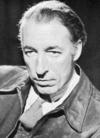- MacNeice, Louis
-
born Sept. 12, 1907, Belfast, Ire.died Sept. 3, 1963, London, Eng.British poet and playwright.He published his first book of poetry, Blind Fireworks (1929), while studying at Oxford. In the 1930s he became known as one of a group of socially committed young poets that included W.H. Auden, C. Day-Lewis, and Stephen Spender. His volumes include Autumn Journal (1939) and The Burning Perch (1963). He wrote and produced radio verse plays for the BBC, notably The Dark Tower (1947), with music by Benjamin Britten. Among his prose works are Letters from Iceland (1937; with Auden) and The Poetry of W.B. Yeats (1941).
 MacNeiceCamera Press
MacNeiceCamera Press* * *
▪ British poetborn Sept. 12, 1907, Belfast, Ire.died Sept. 3, 1963, London, Eng.British poet and playwright, a member, with W.H. Auden, C. Day-Lewis, and Stephen Spender, of a group whose low-keyed, unpoetic, socially committed, and topical verse was the “new poetry” of the 1930s.After studying at the University of Oxford (1926–30), MacNeice became a lecturer in classics at the University of Birmingham (1930–36) and later in Greek at the Bedford College for Women, London (1936–40). In 1941 he began to write and produce radio plays for the British Broadcasting Corporation. Foremost among his fine radio verse plays was the dramatic fantasy The Dark Tower (1947), with music by Benjamin Britten.MacNeice's first book of poetry, Blind Fireworks, appeared in 1929, followed by more than a dozen other volumes, such as Poems (1935), Autumn Journal (1939), Collected Poems, 1925–1948 (1949), and, posthumously, The Burning Perch (1963). An intellectual honesty, Celtic exuberance, and sardonic humour characterized his poetry, which combined a charming natural lyricism with the mundane patterns of colloquial speech. His most characteristic mood was that of the slightly detached, wryly observant, ironic and witty commentator. Among MacNeice's prose works are Letters from Iceland (with W.H. Auden, 1937) and The Poetry of W.B. Yeats (1941). He was also a skilled translator, particularly of Horace and Aeschylus (Agamemnon, 1936).* * *
Universalium. 2010.
